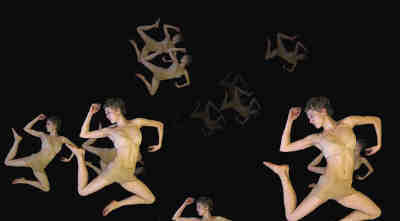

 |
 |
|

Varese & Stravinsky Varese Arcana London Philharmonic Orchestra/Marin Alsop Royal Festival Hall 27 June 2007 Preceded by Glass's tired Akhnaten Prelude - one longed for it to finish; eventually it just stopped - Arcana (1927) made a brave noise after Marin Alsop had softened up the audience with a jokey introduction - "Varese only composed half a dozen works; after this you'll know why" etc. Having known it before on CD and in concert (Boulez), the shock of the old failed to register in the less abrasive acoustic of the "new" Festival Hall. The Rite still retains impact after however many hearings, but that really was not increased by Klaus Obermaier's gimmicky "dissolution of our sensory perception - - takes us to the limits of our existence", possibly in an early stage of development? For those too young to have enjoyed being scared at the cinema in our youths with red/green stereoscoping glasses, it was mildly exciting to have Julia Mach multiplied and her hands and feet coming in virtual imagery near enough to touch. But much of the 'refracted, transmuted imagery' was trite, with naive ideas (e.g. disembodied duplicated legs) foisting themselves on our attention for far too long. On the whole, I preferred watching her 'live'. The stage was very full; we watched the tuba being hoisted across at the back with some difficulty, only to disappear for the rest of the evening behind the special dance stage, along with the trombones, out of sight of the majority of the audience. That undermined the efforts of the acousticians to improve the weak low frequency sound, as proudly explained in the programme by Larry Kirksgaard, who told us that even the seats we were occupying had been made 'more acoustically appropriate'... The preoccupation today with concerts in the dark - leave your scores at home - had late-comers at hazard trying to find their seats. Only a quick few were able to grab the very few chairs supplied in the new large bar areas. The management had relented about tap water; it was once again available on the counter, having in the first week required individual ordering glass by glass from the bar staff. We heard complaints about the length of the queues to pick up pre-paid tickets; at least people weren't fined as happens in a similar situation at Waterloo Station where passengers reluctant to miss their trains risk hefty fines on board... Tomorrow a more normal symphony concert, with Brahms No 2 & Brendel in Beethoven. Peter Grahame Woolf Ades, Beethoven & Brahms Thomas Ades Asyla Philharmonia/Christoph von Dohnanyi/conductor At last the Royal Festival Hall in an "ordinary" concert of the highest standard, one which showed off the recently unveiled improvements in each work. Asyla (1997) showed how the hall's new acoustic can contribute to clarification of complexities as well as immediacy. One could pinpoint with the ears every musician's location, and the huge percussion department was shown off to best advantage, quiet as well as loud. Brendel (fingers crossed, because he has shown fallibility of late) was in magisterial form and in accord with Dohnanyi. From the press seats one was able to savour with renewed pleasure every orchestral feature at all dynamic levels; I hope to confirm in due course that this remains so elsewhere in the hall. No one was just going through the motions with a canonic classic they'd played a hundred time. Likewise, I anticipated the Brahms with high expectations, remembering Christoph von Dohnanyi conducting Brahms No. 4, which I'd been privileged to hear in 2002 in the company of the renowned Russell Johnson, acoustic designer of the KKL, reckoned to be the world leader of concert halls at that time. He had decided that you're onto a loser if you try to improve older halls; I'm beginning to think that Larry Kirkegaard is proving him wrong. It was a wonderful performance, and being recorded for LPO Live, so look out for its release oh CD. In these early weeks one is still giving attention to externals and indications of SBC policy. Mercifully, we were at last back to a normal concert situation, as for concerts in the RFH of old. The obsession with darkness was in abeyance - the ighting was perfect, slightly dimmed but not too much for score-reading. Few were availing themselves of the glass-holders attached to each new seat and the announcements over the loud speakers were given by a pleasant feminine voice, not as hectoring as the (always too loud) usual recorded messages. It is sensible to change those regularly; even worse than South Bank Centre's are those of the Jubilee tube, with the same aggressive male commanding us year after year (unnecessarily) not to block the doors... All those little things do matter. Peter Grahame Woolf
|